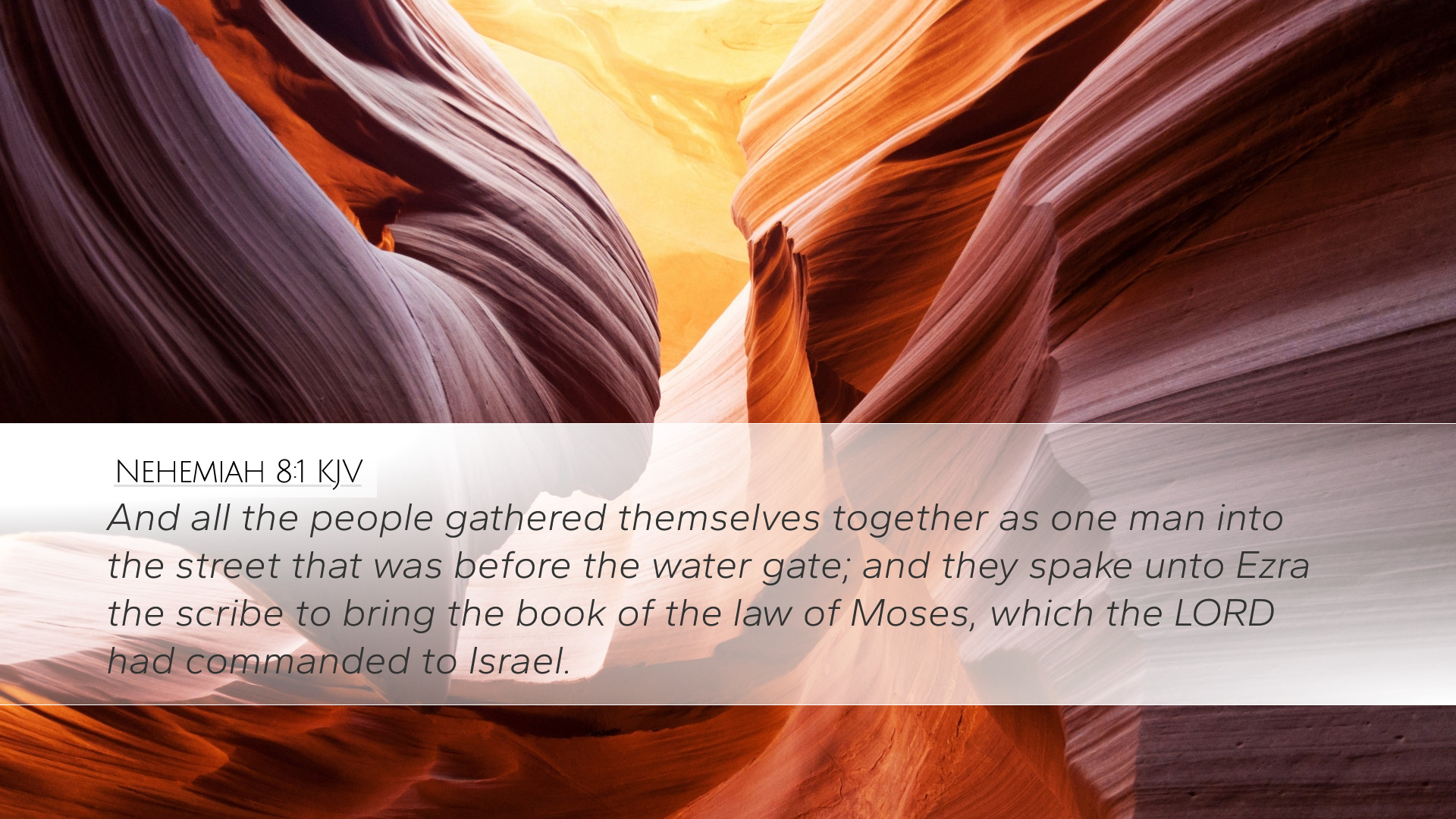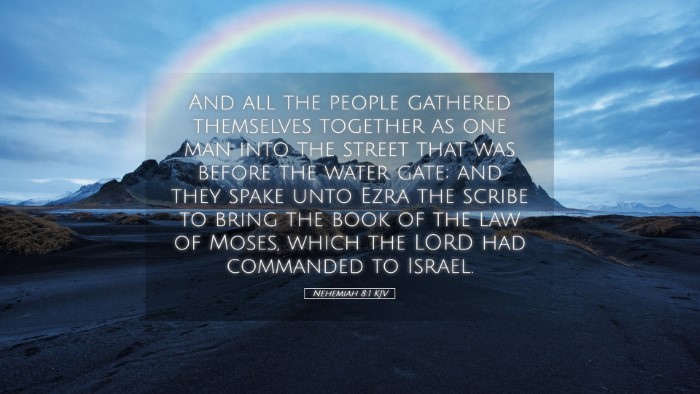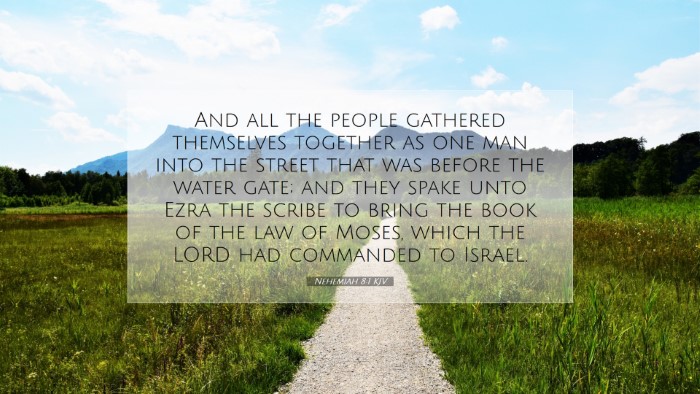Old Testament
Genesis Exodus Leviticus Numbers Deuteronomy Joshua Judges Ruth 1 Samuel 2 Samuel 1 Kings 2 Kings 1 Chronicles 2 Chronicles Ezra Nehemiah Esther Job Psalms Proverbs Ecclesiastes Song of Solomon Isaiah Jeremiah Lamentations Ezekiel Daniel Hosea Joel Amos Obadiah Jonah Micah Nahum Habakkuk Zephaniah Haggai Zechariah MalachiNehemiah 8:1
Nehemiah 8:1 KJV
And all the people gathered themselves together as one man into the street that was before the water gate; and they spake unto Ezra the scribe to bring the book of the law of Moses, which the LORD had commanded to Israel.
Nehemiah 8:1 Bible Commentary
Commentary on Nehemiah 8:1
Nehemiah 8:1 (KJV): "And all the people gathered themselves together as one man into the street that was before the water gate; and they spake unto Ezra the scribe to bring the book of the law of Moses, which the Lord had commanded to Israel."
Contextual Overview
Nehemiah 8:1 marks a significant moment in the post-exilic history of Israel. Following the return from Babylonian captivity, the Israelites experienced a revival of spiritual fervor that involved the public reading of the Law of Moses. This event reflects the people's desire to reconnect with their covenant identity and underscores the importance of Scripture in their communal life.
Gathering of the People
The verse describes a remarkable gathering: "All the people gathered themselves together as one man." This phrase conveys the unity and collective purpose of the Israelites. They came together not merely out of obligation but from a deep spiritual hunger for God's Word.
- Unity in Purpose: This gathering reflects a shared recognition of their need for guidance and instruction. As noted by Matthew Henry, this speaks to the importance of corporate worship and communal hearing of the Word.
- Significance of the Water Gate: The choice of location signifies openness to spiritual renewal. Water often symbolizes life, cleansing, and the presence of God (see John 7:37-38).
The Role of Ezra the Scribe
The people's request for Ezra the scribe indicates their thirst for knowledge and understanding of the Law. They called him to "bring the book of the law of Moses." This act of seeking Scripture reveals several key insights:
- Desire for God's Truth: The collective call for Scripture suggests an inherent understanding that spiritual nourishment comes from God's Word. Albert Barnes emphasizes the necessity of Scripture in teaching and guiding the faithful.
- Authority of the Word: Ezra's role as a scribe denotes an authority derived from his knowledge of the Law. The people recognized him as a spiritual leader capable of providing divine insight—a point elaborated by Adam Clarke who notes the significant position of scribes in interpreting the law.
The Law of Moses
The request to bring "the book of the law of Moses, which the Lord had commanded to Israel" highlights several theological themes:
- Covenant Identity: The Law represents the covenant relationship between God and Israel, serving as both a blessing and a guide. Understanding the Law was vital for their identity as God's chosen people.
- Obedience and Blessing: The call to return to the Law emphasizes the need for obedience in order to experience God's blessings. As Matthew Henry points out, familiarity with the Law brings about awareness of one's duty and God’s promises.
Application for Today's Believers
Nehemiah 8:1 serves as a timeless exhortation for congregations to prioritize the reading and understanding of Scripture. In a world filled with distractions, the unity and purpose demonstrated by the Israelites challenge modern believers to gather around God's Word with intentionality.
- Communal Worship: The fact that the people gathered as "one man" instructs today's church on the power of unity in worshiping God.
- Longing for God’s Word: There is a need for a deeper hunger for the Scriptures, mirrored in the desire of the people who approached Ezra. Pastors and leaders should foster environments where the Word of God is read, taught, and cherished.
- Commitment to Obedience: The ultimate goal of engaging with Scripture is transformation through obedience. The Law is not merely historical but is alive and active, shaping the character and conduct of believers today.
Conclusion
In conclusion, Nehemiah 8:1 paints a powerful portrait of a community drawn together by their love for God’s Word. It serves as a reminder that success in ministry and personal faith walks hinges largely on our attentiveness to the Scriptures, our willingness to gather in unity, and our commitment to live out what we learn. Each believer is invited into this sacred space of communal worship and Scriptural engagement, nurturing a vibrant faith that can withstand the challenges of the world.


